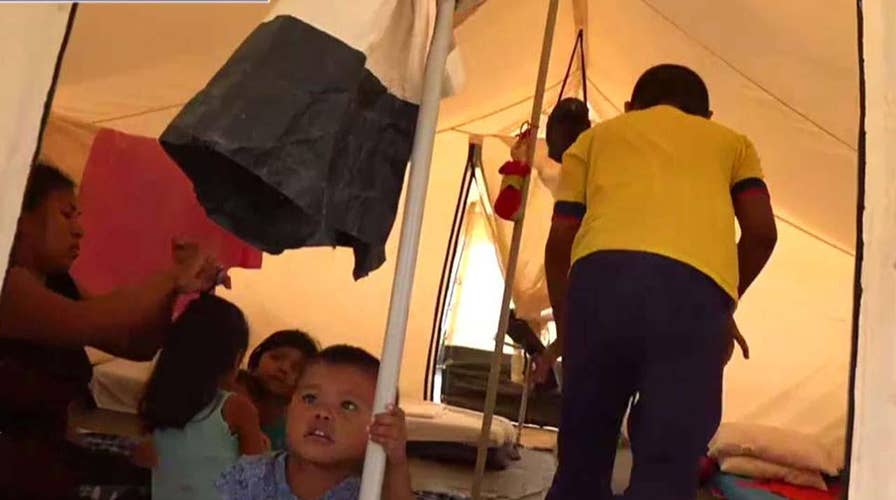Crisis in Venezuela: UN sets up a refugee camp in Maicao, Colombia
Humanitarian workers with the United Nations help refugees escaping Venezuela; Ellison Barber reports.
It was a surreal moment as I stood on the Simon Bolivar bridge in Colombia, watching people from Venezuela stream past. I saw parents juggling babies, toilet paper, and groceries. Older women in wheelchairs and students in school uniforms and backpacks.
This border crossing between Colombia and Venezuela reopened just a few days before I arrived. Prior to that, only students or those with medical notes could get through.
INTERNATIONAL GROUPS FOCUSED ON VENEZUELA CRISIS MEET AT UN
On the day I was there, nearly 30,000 people crossed over the bridge. Less than 5,000 would stay, while the vast majority return home, taking the medicine, food, or goods that they can’t afford to buy in Venezuela.

People stream across the Simon Bolivar bridge at the border between Venezuela and Colombia. The border just recently re-opened for all foot traffic. Since then approximately 30,000 people have been coming across each day.
The sadness was overwhelming -- so different from the last time I was here many years ago. That had been a happy day, an outing with my family where we crossed into Colombia and ate lunch before returning home.
At the time, Venezuela was the ‘American dream’ of Latin America -- the place everyone wanted to go, to seek out a better job, and get a piece of the country’s prosperity.
Growing up there for most of my childhood, I lived in a country that was united and prosperous and safe. That doesn’t exist anymore.
When I talk to my friends still in Venezuela, they tell me about rolling power outages and watching their children waste away in front of their eyes because they can’t afford to feed them.
In the inflated economy, a month’s wages buy a small bag of cornmeal, half a carton of eggs, a little ham. They tell me they’re afraid to go out at night; that they’ve blockaded their homes against looters and thieves. When I lived there, we left our doors unlocked.
It’s hard to think about the narrow window between my comfortable life now and theirs. It came down to my American passport. I left the country as a teenager after my family experienced hardship, but it was tough to start over in the U.S. I worked hard, taking any job where they would hire me.
Through my own efforts and thanks to a scholarship, I eventually made it into a good college. Someone gave me a chance, and I was able to build a career and family in a stable, thriving country. Now, I am the president of World Vision U.S., one of the largest Christian humanitarian organizations in the world.
It’s amazing to me that you don’t hear much about this crisis in the U.S., even though the United Nations estimates that by the end of the year, nearly five million Venezuelans will have left their country.
That’s nearly as many refugees as have fled Syria.
If you do hear about this crisis in the news, it’s about regional or U.S. politics or the math of the hyper-inflated currency. It’s rarely about the people, but once you’ve seen it firsthand, it’s hard not to think about the people: the moms and dads making the difficult choice to take the dangerous journey; the kids who are suffering.
But I also think about the people of faith across Colombia and the region, working in churches that are stepping up to help however they can, even if they don’t have the resources. It’s incredible to see what those churches do even with the small amounts they’re given.
World Vision is supplying things like food, hygiene kits, and school supplies for children. The local churches distribute that and offer even more -- spiritual food and prayer for the struggling families.

Jheyde Yepez, 13, speaks to World Vision U.S. President Edgar Sandoval Sr. about her experience fleeing Venezuela and settling in Colombia. Jheyde used to beg on the streets, now thanks to World Vision she is able to attend school and is hoping to start her own business in English translation.
I spoke with a 13-year-old Venezuelan girl who is now at a school World Vision supports. She told me about how while on a bus trip, she broke down crying at the site of a place she had been begging for food as a refugee just a few short months earlier.
CLICK HERE TO GET THE FOX NEWS APP
Now that she’s in school again, she’s dreaming of starting her own business, and I can tell she has the tenacity and intelligence to make it happen. She’s preparing to live her own version of the American dream right in Colombia because someone gave her a chance.
So many other Venezuelans deserve a chance at a better life, too. I pray that we can be the ones to help them.

